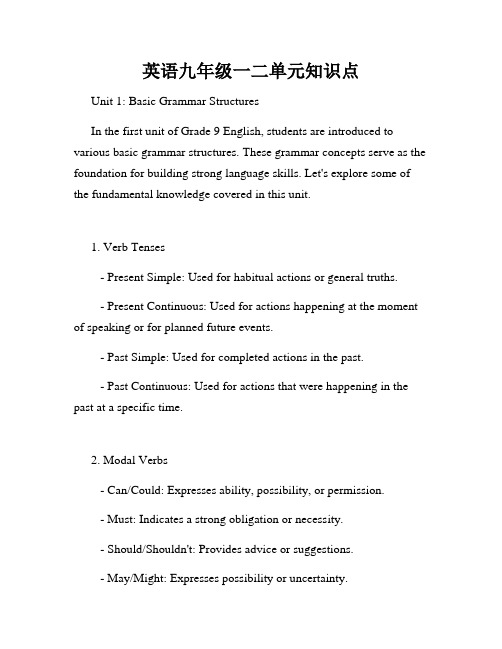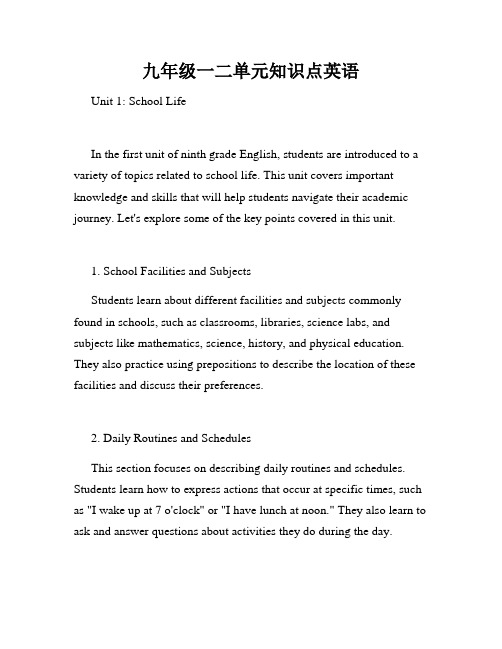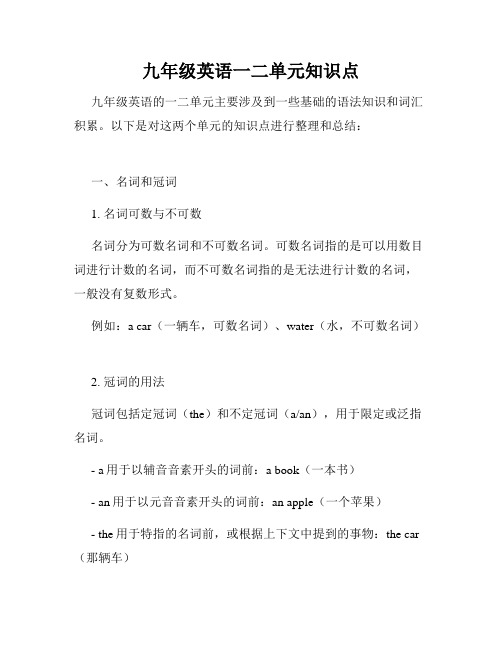九年级英语Units1-12知识汇总
九年级英语上册各单元知识点归纳

九年级英语上册各单元知识点归纳第一单元:基础知识1. 介词短语的使用:介词短语是由一个介词和它的宾语组成的短语,用来表示时间、地点、方向、原因等。
例如:"on the table"(在桌子上),"in the park"(在公园里)。
介词短语在句子中作状语、定语、宾语等。
需要注意介词与宾语之间的搭配。
2. 动词的时态和语态:英语中的动词有多种时态和语态。
常见的时态有一般现在时、一般过去时、一般将来时等。
常见的语态有主动语态和被动语态。
时态用于表示动作发生的时间,语态用于表示动作的执行者。
例如:"She is reading a book."(她正在读一本书)。
需要注意时态和语态的用法和变化规则。
3. 名词的单复数形式:英语中的名词有单数和复数形式。
复数形式一般是在名词后面加-s或-es。
有些名词的复数形式较特殊,需要记忆。
例如:"a cat"(一只猫)的复数形式是"cats"(多只猫)。
需要注意名词的单复数形式在句子中的搭配和用法。
第二单元:阅读理解1. 完型填空:完型填空是一种考察学生对语境理解和词汇运用能力的题型。
在完型填空中,通常给出一篇文章和一些空格,要求学生根据文章内容和语境选择正确的单词或短语填入空格中。
通常需要结合文章整体逻辑和上下文意义来填写正确答案。
2. 阅读理解题:阅读理解题是一种考察学生阅读理解能力和推理能力的题型。
通常会给出一篇短文或文章,然后根据文章内容提出一些问题,要求学生根据文章内容和推理来回答问题。
需要学会熟练阅读和理解文章,抓住关键信息和主题,并能运用推理等能力来回答问题。
第三单元:语法知识1. 直接引语和间接引语:在英语中,当我们引述别人的话时,可以使用直接引语和间接引语。
直接引语是直接引用别人所说的话,使用引号将其包围;间接引语是将别人所说的话转述出来。
例如:直接引语:"I am happy," she said.(她说:“我很开心。
英语九年级一二单元知识点

英语九年级一二单元知识点Unit 1: Basic Grammar StructuresIn the first unit of Grade 9 English, students are introduced to various basic grammar structures. These grammar concepts serve as the foundation for building strong language skills. Let's explore some of the fundamental knowledge covered in this unit.1. Verb Tenses- Present Simple: Used for habitual actions or general truths.- Present Continuous: Used for actions happening at the moment of speaking or for planned future events.- Past Simple: Used for completed actions in the past.- Past Continuous: Used for actions that were happening in the past at a specific time.2. Modal Verbs- Can/Could: Expresses ability, possibility, or permission.- Must: Indicates a strong obligation or necessity.- Should/Shouldn't: Provides advice or suggestions.- May/Might: Expresses possibility or uncertainty.3. Subject-Verb Agreement- The subject and verb must agree in number (singular or plural).- Singular subjects take singular verbs, while plural subjects take plural verbs.4. Comparisons- Comparative Form: Used to compare two things.- Superlative Form: Used to compare more than two things.Unit 2: Vocabulary and Reading ComprehensionIn the second unit of Grade 9 English, students focus on expanding their vocabulary and developing reading comprehension skills. Let's explore the key topics covered in this unit.1. Word Formation- Prefixes: Added to the beginning of a word to change its meaning.- Suffixes: Added to the end of a word to change its meaning or create a new word.2. Context Clues- Using surrounding words and sentences to determine the meaning of an unfamiliar word.3. Inference- Drawing conclusions based on information provided in the text.4. Skimming and Scanning- Skimming: Quickly reading to get a general idea of the text.- Scanning: Searching for specific information in the text.5. Summarizing- Condensing the main ideas and important details of a text into a concise summary.By mastering the grammar structures and vocabulary introduced in these first two units, students will build a solid foundation for their English language skills. These essential knowledge points will support their further learning and proficiency in the language.Remember, practice makes perfect! Regular revision and applying these knowledge points in daily English usage will enhance your understanding and fluency in the language. Keep exploring and expanding your English abilities, and you'll soon see significant progress in your language journey.。
英语九年级上册一二单元知识点

《英语九年级上册一二单元知识点》一、词汇和短语1. 掌握单元主题相关的词汇和短语,包括描述人的形容词、名词和动词等。
2. 理解并使用常见的学科词汇,如科学、数学、历史等。
3. 学习并掌握与学校生活相关的短语和表达方式。
二、语法知识1. 掌握过去完成时态的使用方法及其相关的句型结构。
2. 学习并掌握宾语从句的用法,特别是与被动语态相关的宾语从句。
3. 学习并理解直接引语和间接引语之间的转换规则。
三、阅读技巧和策略1. 学习并掌握如何快速阅读,理解文章大意和主题思想。
2. 学习并掌握如何识别主题句和支撑句,理解文章结构。
3. 学习并掌握一些阅读技巧,如略读、扫读和预测等。
四、写作技巧和策略1. 学习并掌握如何组织写作结构,使其逻辑清晰、条理分明。
2. 学习并掌握如何使用连接词和短语,使文章流畅自然。
3. 练习写作与单元主题相关的短文,以提高写作能力。
五、口语表达技巧1. 学习并掌握与单元主题相关的日常会话用语。
2. 练习用英语描述学校生活和与人交往的经历,以提高口语表达能力。
3. 参与课堂上的口语活动,积极参与讨论,以提高口语交际能力。
六、文化知识拓展1. 学习并了解单元主题相关的英美文化背景知识。
2. 了解中西方文化差异,以更好地理解和运用英语。
3. 拓展与单元主题相关的文化知识,如学校生活、教育制度等。
总之,九年级上册一二单元是英语学习的重要阶段,需要学生掌握大量的词汇、语法、阅读、写作和口语技巧,同时也要了解相关的文化知识。
通过系统地学习和练习,学生可以更好地掌握英语,提高英语综合能力。
九年级一二单元知识点英语

九年级一二单元知识点英语Unit 1: School LifeIn the first unit of ninth grade English, students are introduced to a variety of topics related to school life. This unit covers important knowledge and skills that will help students navigate their academic journey. Let's explore some of the key points covered in this unit.1. School Facilities and SubjectsStudents learn about different facilities and subjects commonly found in schools, such as classrooms, libraries, science labs, and subjects like mathematics, science, history, and physical education. They also practice using prepositions to describe the location of these facilities and discuss their preferences.2. Daily Routines and SchedulesThis section focuses on describing daily routines and schedules. Students learn how to express actions that occur at specific times, such as "I wake up at 7 o'clock" or "I have lunch at noon." They also learn to ask and answer questions about activities they do during the day.3. School Rules and RegulationsSchool rules and regulations play a crucial role in maintaining order and discipline. In this section, students learn vocabulary related to rules and regulations and practice using modal verbs to express obligations, permissions, and prohibitions. They also discuss the consequences of breaking rules and share their opinions about various school rules.4. School Events and CelebrationsSchool events and celebrations are an integral part of students' school life. This section introduces vocabulary related to events, such as sports day, talent show, and cultural festivals. Students learn to talk about their participation in these events, describe their experiences, and express opinions about them.Unit 2: Personal ExperiencesThe second unit of ninth grade English focuses on personal experiences. This unit explores various topics that allow students to reflect on their own lives and share their experiences with others. Let's delve into the key points covered in this unit.1. Hobbies and Interestsinterests. Students learn vocabulary related to different hobbies, such as playing musical instruments, reading books, and playing sports. They also practice expressing preferences and discussing reasons behind their choices.2. Travel and PlacesTraveling and exploring new places broaden our horizons. In this section, students learn vocabulary related to travel and places, such as tourist attractions, landmarks, and transportation. They learn to describe their travel experiences, discuss their favorite destinations, and express opinions about different places.3. Personal Achievements and ChallengesEveryone faces achievements and challenges in life. This section focuses on vocabulary related to personal achievements, such as winning a competition or receiving an award, and challenges, such as overcoming a fear or facing a difficult situation. Students share their own experiences, discuss strategies for overcoming challenges, and offer encouragement to their peers.4. Future Plans and Ambitionsand ambitions. They learn vocabulary related to career choices, educational goals, and aspirations. Students practice talking about their future plans, discussing their dreams and ambitions, and expressing opinions about different career paths.ConclusionThe first two units of ninth grade English provide students with essential knowledge and skills related to school life and personal experiences. By mastering the concepts covered in these units, students will be better equipped to communicate effectively, express their thoughts and opinions, and engage in meaningful conversations in English. So, let's embrace these knowledge points and continue our English language learning journey with enthusiasm and determination.。
九年级英语一二单元知识点

九年级英语一二单元知识点九年级英语的一二单元主要涉及到一些基础的语法知识和词汇积累。
以下是对这两个单元的知识点进行整理和总结:一、名词和冠词1. 名词可数与不可数名词分为可数名词和不可数名词。
可数名词指的是可以用数目词进行计数的名词,而不可数名词指的是无法进行计数的名词,一般没有复数形式。
例如:a car(一辆车,可数名词)、water(水,不可数名词)2. 冠词的用法冠词包括定冠词(the)和不定冠词(a/an),用于限定或泛指名词。
- a用于以辅音音素开头的词前:a book(一本书)- an用于以元音音素开头的词前:an apple(一个苹果)- the用于特指的名词前,或根据上下文中提到的事物:the car (那辆车)二、动词时态和语态1. 动词的时态动词时态包括一般现在时、一般过去时、一般将来时等。
时态的使用要结合具体情境来确定。
例如:She sings beautifully.(她唱得很美。
一般现在时)They visited Beijing last summer.(他们去年夏天参观了北京。
一般过去时)2. 动词的语态动词语态包括主动语态和被动语态。
在被动语态中,主语是动作的承受者。
例如:The book was written by Mark Twain.(这本书是由马克·吐温所写的。
被动语态)三、形容词和副词1. 形容词的比较级和最高级形容词的比较级用于比较两个人或物的程度,最高级则用于比较三者或三者以上的程度。
例如:The weather is hotter today than yesterday.(今天的天气比昨天热。
比较级)He is the tallest boy in our class.(他是我们班最高的男孩。
最高级)2. 副词的比较级和最高级副词的比较级和最高级的形式和用法与形容词类似。
例如:She sings more beautifully than her sister.(她唱得比她姐姐更好听。
九年级英语Units1-12重点梳理

九年级英语Units1-12重点梳理Unit11. by + doing通过……方式如:by studying with a groupby 还可以表示:“在…旁”、“靠近”、“在…期间”、“用、”“经过”、“乘车”等如:I live by the river. I have to go back by ten o’clock.The thief entered the room by the window.The student went to park by bus.2. talk about 谈论,议论,讨论(后面跟某事)如:The students often talk aboutmovie after class. 学生们常常在课后讨论电影。
talk to sb. === talk with sb. 与某人说话(后面跟某人)3. 提建议的句子:①What/ how about +doing sth.? 如:What/ How about going shopping?②Why don’t you + do sth.(后跟原形)?如:Why don’t you go shopping?③Why not + do sth.(后跟原形) ? 如:Why not go shopping?④Let’s + do sth.(后跟原形)如: Let’s go shopping⑤Shall we/ I + do sth.?(后跟原形)如:Shall we/ I go shopping?4. a lot 许多常用于句末如:I eat a lot. 我吃了许多。
5. too…to 太…而不能常用的句型too+adj./adv. + to do sth.同义短语so +adj.+that +从句not adj.+enough to+do sth.如:I’m too tired to say anything. = I’m so tired that I can’t say anything.我太累了,什么都不想说。
人教版九年级英语Unit1-Unit12单元知识点复习资料.

s九年级英语单元知识点复习资料Unit 1Section A一、短语1.by介词,“通过…(方式,手段)”by making flashcards 通过做单词抽认卡by doing sth 通过…..方式(途径)。
例:I learn English by listening to tapes.②在…..旁边。
例:by the window/the door③乘坐交通工具例:by bus/car④在……之前,到……为止。
例:by October在10月前⑤被例:English is spoken by many people.2.read the textbook读/看教科书3.make vocabulary lists 列生词表4.listen to tapes听磁带5.ask sb for help向某人求助6.study for a test为备考学习7.watch videos观看录像8.practice sth练习某事;practice doing sth练习做某事Do you ever practice conversations with friends?I have to practice speaking English everyday.9.read aloud朗读10.that way=in that way通过那种方式11.improve my speaking skills 提高我的会话技巧12. too…to…太….而不能…It’s too hard for me to understand the a rticle.= It’s so hard that I can’t understand the article.13. for example=for instance 例如14. ask about询问有关…;ask sb about sth向某人询问/打听有关….We asked them about the best ways to learn more English. I want to ask about the use of the new machines(机器).15. watch/see/hear sb do sth 观看/看见/听见某人做过某事;watch/see/hear sb doing sth 观看/看见/听见某人正在做某事He can watch actors say the words.Can you hear him singing in the room?16. 辨析:sometime ;sometimes ;some times ;some time ①sometime在将来/过去的某一时间I’ll speak to him about it sometime. 我会找个时间和他谈谈这事.I met her sometime last year.去年的某个时候我见过她.② sometimes = at times有时,偶尔It is sometimes hot and sometimes cold here.He sometimes writes to me.③some time A.一些时间:It will take you some time to walk there. B.在未来的某时=sometime: Phone me some time next week下个星期什么时候给我打电话吧.④some times一些次,几次I've told him the thing some times.17. join短语:①join sb加入到某人的活动中去②join in+活动项目"参加…活动" I'd like to join in the game.③join+组织机构"加入到某个组织机构,成为其中的一个成员"join the Party (党); join the League(团),The best way to improve your English is to join an English club.18. have fun 玩得高兴19. not at all 一点也不20. get excited 高兴、激动21. end up (vi.) 结束; 告终; 结果; 最后end up doing sth.We end up taking a taxi there .我们结果乘出租车去了那里.We sometimes end up speaking in Chinese.(以说汉语结束对话)22. do a survey 做调查;do a survey about针对…做调查I'm doing a survey about learning English. 我在进行学习英语的调查。
九年级全一册unit12知识点

九年级全一册unit12知识点九年级全一册Unit 12知识点随着学习的不断深入,九年级学生们接触到了更加复杂和抽象的知识内容。
Unit 12是全一册中的最后一个单元,也是一个重要且关键的阶段。
在这个单元中,学生们将学习一些新的知识点和技能,为进一步提高他们的学习能力奠定基础。
一、动词时态的复习与运用在Unit 12中,学生们将复习并运用动词时态。
动词时态是指动作或状态发生的时间。
英语中有许多时态,包括过去时、现在时和将来时等。
通过语境和语法规则,学生们可以正确地使用各种时态来表达自己的想法和过去、现在、将来的事情。
例如,在Unit 12中有一个语法任务是填充动词填空,要求学生们根据句子的时态填入正确的动词形式。
通过这样的任务,学生们可以加深对动词时态的理解,并熟练地运用到实际的语言表达中。
二、语法规则的运用与记忆策略Unit 12还包括其他重要的语法知识点,例如条件状语从句和比较级和最高级等。
条件状语从句用来表达一个假设情况下的结果,比较级和最高级则用来比较两个或多个事物的程度或大小。
对于这些语法规则,学生们需要在课堂上进行充分的理解和练习,还可以通过记忆策略来帮助自己更好地掌握。
例如,对于条件状语从句,学生们可以记住以下句型:If + 条件句,主句。
通过课堂练习,他们可以分析句子结构并理解条件状语从句中的语法规则。
同时,通过多读和多写,加深对这个语法知识点的记忆和运用。
三、写作技巧的提高在Unit 12中,学生们将有机会运用所学的知识点,尤其是动词时态和语法规则,来提高他们的写作能力。
写作是一项重要的语言交流技能,通过写作,学生们可以表达自己的观点和想法,并提升自己的表达能力。
在写作方面,学生们可以通过以下几个方面来提高自己的能力:1. 扩大词汇量:学生们可以通过背单词、读英语文章等方式来扩大自己的词汇量。
在写作中使用更多的词汇,可以使文章更加丰富、生动。
2. 练习语法:语法是写作的基础,学生们需要熟练地运用语法规则来构建句子和表达意思。
- 1、下载文档前请自行甄别文档内容的完整性,平台不提供额外的编辑、内容补充、找答案等附加服务。
- 2、"仅部分预览"的文档,不可在线预览部分如存在完整性等问题,可反馈申请退款(可完整预览的文档不适用该条件!)。
- 3、如文档侵犯您的权益,请联系客服反馈,我们会尽快为您处理(人工客服工作时间:9:00-18:30)。
九年级英语Unit1-Unit12知识汇总Unit11. by + doing通过……方式如:by studying with a groupby 还可以表示:“在…旁”、“靠近”、“在…期间”、“用、“经过”、“乘车”等如:I live by the river. I have to go back by ten o’clock.The thief entered the room by the window.The student went to park by bus.2. talk about 谈论,议论,讨论如:The students often talk about movie after class.学生们常常在课后讨论电影。
talk to sb. === talk with sb. 与某人说话3. 提建议的句子:①What/ how about +doing sth.?如:What/ How about going shopping?②Why don’t you + do sth.?如:Why don’t you go shopping?③Why not + do sth. ? 如:Why not go shopping?④Let’s + do sth. 如: Let’s go shopping⑤Shall we/ I + do sth.?如:Shall we/ I go shopping?4. a lot 许多常用于句末如:I eat a lot. 我吃了许多。
5. too…to 太…而不能常用的句型too+adj./adv. + to do sth.如:I’m too tired to say anything. 我太累了,什么都不想说。
6. aloud, loud与loudly的用法三个词都与"大声"或"响亮"有关。
①aloud是副词,重点在出声能让人听见,但声音不一定很大,常用在读书或说话上。
通常放在动词之后。
aloud没有比较级形式。
如: He read the story aloud to his son.他朗读那篇故事给他儿子听。
②loud可作形容词或副词。
用作副词时,常与speak, talk,laugh等动词连用,多用于比较级,须放在动词之后。
如:She told us to speak a little louder. 她让我们说大声一点。
③loudly是副词,与loud同义,有时两者可替换使用,但往往含有令人讨厌或打扰别人的意思,可位于动词之前或之后。
如:He does not talk loudly or laugh loudly in public. 他不当众大声谈笑。
7. not …at all 一点也不根本不如:I like milk very much. I don't like coffee at all. 我非常喜欢牛奶。
我一点也不喜欢咖啡。
not经常可以和助动词结合在一起,at all 则放在句尾8. be / get excited about sth.=== be / get excited about doing sth.=== be excited to do sth. 对…感兴奋如:I am / get excited about going to Beijing.===I am excited to go to Beijing. 我对去北京感到兴奋。
9. ①end up doing sth 终止做某事,结束做某事如:The party ended up singing. 晚会以唱歌而结束。
②end up with sth. 以…结束如:The party ended up with her singing. 晚会以她的歌唱而告终。
10. first of all 首先. to begin with 一开始later on 后来、随11. also也、而且(用于肯定句)常在句子的中间either也(用于否定句)常在句末too也 (用于肯定句) 常在句末12. make mistakes 犯错如:I often make mistakes. 我经常犯错。
make a mistake 犯一个错误如: I have made a mistake.我已经犯了一个错误。
13. laugh at sb. 笑话;取笑(某人)如:Don’t laugh at me不要取笑我!14. take notes 做笔记,做记录15. enjoy doing sth .喜欢做…乐意做…如:She enjoys playing football. 她喜欢踢足球。
enjoy oneself 过得愉快如:He enjoyed himself. 他过得愉快。
16. native speaker 说本族语的人17. make up 组成、构成18. one of +(the+ 形容词比较级)+名词复数形式…其中之一如: She is one of the most popular teachers.她是最受欢迎的教师之一。
19. It’s +形容词+(for sb. ) to do sth. (对于某人来说)做某事…如:It’s difficult (for me ) to study English.对于我来说学习英语太难了。
句中的it 是形式主语,真正的主语是to study English20. practice doing 练习做某事如:She often practice speaking English. 她经常练习说英语。
21. decide to do sth. 决定做某事如:LiLei has decided to go to BeiJing . 李雷已经决定去北京。
22. unless 假如不,除非引导条件状语从句如:You will fail unless you work hard..假如你不努力你会失败。
I won’t write unless he writes first. 除非他先写要不我不写23. deal with 处理如:I dealt with a lot of problem.24. worry about sb./ sth. 担心某人/ 某事如:Mother worried about his son just now.妈妈刚才担心他的儿子。
25. be angry with sb. 对某人生气如:I was angry with her. 我对她生气。
26. perhaps === maybe 也许27. go by (时间) 过去如: Two years went by. 两年过去了。
28. see sb. / sth. doing看见某人正在做某事强调正在发生see sb. / sth. do看见某人在做某事如:如: She saw him drawing a picture in the classroom.她看见他正在教室里画画。
29. each other 彼此30. regard… as …把…看作为….如:The boys regarded Anna as a fool. 这些男孩把安娜看成傻瓜。
31. too many 许多修饰可数名词如:too many girlstoo much 许多修饰不可数名词如:too much milkmuch too 太修饰形容词如:much too beautiful 32. change…into…将…变为…如:The magician changed the pen into a book.这个魔术师将这本书变为一本书。
33. with the help of sb. == with one’s help 在某人的帮助下如:with the help of LiLei == with LiLei’s help在李雷的帮助下34. compare … to …把…与…相比如:Compare you to Anna, you are lucky.你和安娜相比,你是幸运的。
35. instead 代替用在句末,副词(字面上常不译出来)instead of sth. / doing sth. 代替,而不是用在句中,动词如:Last summer I went to Beijing. This year I’m going to Shanghai instead.去年夏天我去北京, 今年我将要去上海。
I will go instead of you. 我将代替你去。
He stayed at home instead of going swimming. 他呆在家里而不是去游泳。
九年级英语Unit21. used to do sth. 过去常常做某事否定形式:didn’t use to do sth. / used not to do sth.如:He used to play football after school. 放学后他过去常常踢足球。
Did he use to play football? Yes, I did. No, I didn’t.He didn’t use to smoke. 他过去不吸烟。
2. 反意疑问句①肯定陈述句+否定提问如:Lily is a student, isn’t she?Lily will go to China, won’t she?②否定陈述句+肯定提问如:She doesn’t come from China, does she?You haven’t finished homework, have you?③提问部分用代词而不用名词 Lily is a student, isn’t she?④陈述句中含有否定意义的词,如:little, few, never, nothing, hardly等。
其反意疑问句用肯定式。
如:He knows little English, does he? 他一点也不懂英语,不是吗?They hardly understood it, did they?他们几乎不明白,不是吗?3. play the piano 弹钢琴4. ①be interested in sth. 对…感兴趣②be interested in doing sth. 对做…感兴趣如:He is interested in math, but he isn’t interested in speaking English. 他对数学感兴趣,但是他对说英语不感兴趣。
